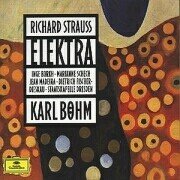| All Artists: Richard [1] Strauss, Karl Böhm, Dresden Staatskapelle, Dresden State Opera Chorus, Gerhard Unger, Dietrich Fischer-Dieskau, Fred Teschler, Fritz Uhl, Gerda Schreyer, Hermi Ambros, Ilona Steingruber, Inge Borkh, Jean Madeira, Judith Hellwig, Margaret Sjostedt, Margarete Sjostedt, Marianne Schech, Renate Reinecke, Siegfried Vogel, Sieglinde Wagner Title: Strauss: Elektra Members Wishing: 0 Total Copies: 0 Label: Dg Imports Release Date: 7/1/1994 Album Type: Import Genre: Classical Style: Opera & Classical Vocal Number of Discs: 2 SwapaCD Credits: 2 UPC: 028944532920 |
Search - Richard [1] Strauss, Karl Böhm, Dresden Staatskapelle :: Strauss: Elektra
 | Richard [1] Strauss, Karl Böhm, Dresden Staatskapelle Strauss: Elektra Genre: Classical
|
Larger Image |
CD Details |
CD ReviewsThe Elektra You Should Own 12/22/2002 (5 out of 5 stars) "While it is often touted that Solti's (or should I say Nilsson's?) recording of Elektra is the one you should buy first. As much as I love that performance, and think it is probably the best introduction to this work along side this recording, this is really the better performance. The only (slight) reservation which I could have is the fact the the Staatskapelle Dresden, who play absolutely magnificently and right in the idiom of the music, could have been recorded with some more detail. Not that anything is obscured, but the Solti recording (because of the recording, not the interpretation) lets you hear just a few things with more clarity. There is also very occasional and very slight distortion on the voice when they hit the high notes (maybe twice in the whole recording, and for about 1/4 of a second). But the performance is magnicent. Bohm is in his element, and the Staatskapelle Dresden, as I hinted before, give him their all, which is quite a lot. Inge Borkh was the best interpreter of the role, even more so than Nilsson. She was as steady as Nilsson (except for her high C, but still, that is not bad), and she brought a more detailed character to Elektra, better conveying her fractured mental state and different moods. Jean Madeira delivers everything as Klytamnestra. Her voice is totally secure for the whole time she is on stage, and her voice is sumptuous. She avoids the histrionics that ruin some performances of the role, but still manages to convey the Klytamnestra's mania and twisted sickness. Marianne Schech as Chrysothemis is excellent, her tone suffieciently different from Borkh's so that you can tell them apart. Dietrich Fischer-Dieskau as Orest is wonderful, warm and serious at the same time. He has no trouble with the notes, and manages to sound just perfect for the role, as if it was written for him. Lastly, Fritz Uhl is a pefectly suspicious, conniving, depraved Aegisth. All of the supporting roles are filled well, with the luxury casting of Gerhard Unger (the best character opera singer that ever lived) as the junger Diener. If you at first don't love the opera, that's ok. When I first heard it I hated it. But, after a few hearings, it is now one of my favorites. Buy it, play it, love it, and spread the joy of this opera and recording on to some of your friends." Excellent performances R. J. Claster | Van Nuys, CA United States | 07/07/2002 (5 out of 5 stars) "This is the premiere commercial recording of the complete opera (also in stereo) and still one of the best. All the principal roles appear to be sung with both accuracy and emotional commitment (both Borkh and Madeira were at the time among the premiere exponents of the roles of Elektra and Klytamnestra, respectively). Bohm's conducting of the Dresdan Staatskapelle both clarifies the complex orchestral textures and keeps the drama moving relentlessly forward. The only criticism I would make is that the orchestral playing does not quite have the locked in precision and fineness of detail one finds in the excerpts Fritz Reiner recorded on RCA living stereo (although, as to the latter, one should bear in mind that Reiner was working with the production and engineering team of Mohr, Pfeiffer and Layton, one of the best of the 50s and 60's, and moreover, for what it is worth, Borkh has expressed displeasure with the way this DG recording was miked). Moreover, Reiner is especially effective in the way he steadily builds up to and shapes the big orchestral climaxes. Neverthless, this is a superior performance by highly accomplished musicians and Straussians." Terrific opera and amazing performance Sungu Okan | Istanbul, Istanbul Turkey | 08/13/2004 (5 out of 5 stars) "This is one of the best Elektra recording. Karl Bohm, who very close friend of Strauss, is one of the best performer of the composer. And Staatskapelle Dresden is the Strauss' most admired orchestra. Inge Borkh, is may be the best Strauss soprano, also she is amazing in Salome, too and she recorded with Fritz Reiner. Dietrich Fischer Dieskau is already excellent baritone and he sung Orest role, with emotion. In other words: This is a dream cast recording!
I think, Elektra is the most horrific (more than Salome, with it's music, orchestration, colours) opera of Richard Strauss. It is written in very border of tonality. Strauss called very large orchestra, includes bass oboe, 5 clarinet, basset-horns, 8 horns, 6 trumptes, conrabass-trombone (!), 5 tubas, large percussion, almostly 70-80 strings...! Also, this is the first complete recording of Elektra. I suppose, Karl Bohm is more succesful performed, than Sir Georg Solti, who is another famous Strauss conductor. I think, Solti is ill-tempered and his orchestra not play plump, powerful or effective. However, Karl Bohm (I always more admire him) and his orchestra performed with these special features and they are more perfect. This set has full libretto and Karl Bohm's a review on this opera. Highly recommended." |

 Track Listings (10) - Disc #1
Track Listings (10) - Disc #1